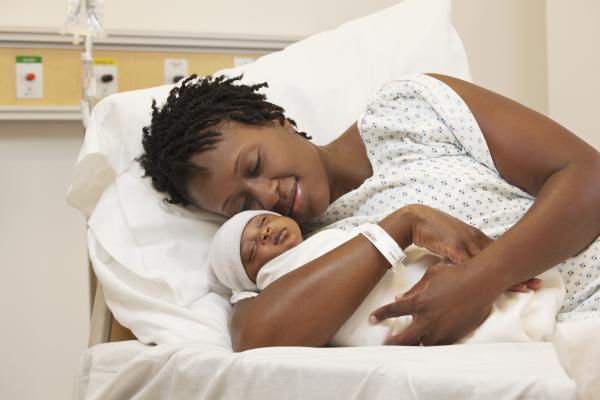Partnering With Communities to Enhance Health Before, During, and After Pregnancy
PROGRAM OVERVIEW
In the United States, women who experience health differences also have higher rates of maternal morbidity and mortality.
The Maternal Health Community Implementation Program (MH-CIP) supports community-engaged implementation research, working with affected communities to improve heart, lung, blood, and sleep health before, during, and after delivery. MH-CIP aligns with the CEAL mission by emphasizing community engagement in all aspects of research. MH-CIP develops and tests community-based implementation strategies to increase the adoption, uptake, and scaling up of evidence-based interventions to improve health before, during, and after pregnancy. The program supports research coalitions that are firmly connected to and embedded in affected communities.

MH-CIP Goals
- Use implementation science to bring effective maternal health interventions into communities severely impacted by maternal health differences.
- Empower the most impacted communities across the U.S. to be full partners in community-engaged implementation research to reduce differences in outcomes in maternal mortality and severe maternal morbidity.
- Identify and disseminate effective implementation strategies that harness community strengths and knowledge to address facilitators or barriers affecting the adoption of evidence-based practices or interventions to improve maternal health.
- Strengthen partnerships between researchers and community-based organizations to support the translation of research into usable tools and knowledge.
Research Coalitions
MH-CIP supports four coalitions comprised of research organizations and community partners. Research coalitions are using Hybrid Type 2 or Type 3 Effectiveness-Implementation study designs to examine the effectiveness and implementation of evidence-based interventions. Community partners co-lead these efforts, ensuring that local knowledge, values, priorities, and strengths are fully considered and incorporated into the research.
| Coalition | Morehouse School of Medicine | New York University Langone Health | Tulane School of Public Health and Tropical Medicine | Center for Women’s Health Research, University of North Carolina at Chapel Hill |
|---|---|---|---|---|
| Study | IMPACT (Improving Preconception Actions and Choices for Tomorrow) | RESTORE (bRidging maternal lifestyle Education and counSeling with CommuniTy health wORkers) | STRIVE (Strategies for Implementing a Postpartum Lifestyle Intervention in WIC Clinics: A Cluster Randomized Trial) | AC3HIEVE (Advancing Community and Clinical Care for Childbirth-related Hypertension through Implementation, Engagement, and Valuing Everyone |
| Intervention | Prepregnancy counseling based on recommendations from the American College of Obstetrics and Gynecology | Just Mothers, a Web application used to deliver the Starting Early Program (StEP), a supportive nutrition and lifestyle counseling program for pregnant women | Type 2 diabetes prevention program at 36 WIC sites | Community-informed training, facilitation, and simulations to support the implementation of the Outpatient Severe Hypertension (O-HTN) Safety Bundle |
| Location | Healthy Start, and similar, clinics in Georgia, North Carolina, South Carolina and Tennessee | Family Health Centers at NYU Langone and NYC Health + Hospitals | WIC clinics in Louisiana | Outpatient clinics in North Carolina |
| Academic Leads | Natalie Hernandez, Ph.D., M.P.H. (Principal Investigator); Latrice Rollins, Ph.D., M.S.W.; Cheryl Franklin, M.D., M.P.H., FACOG; Amy Huebschmann, M.D., M.Sc., FACP (Implementation Science Subject Matter Expert); Meredith Fort, Ph.D. (Implementation Science Subject Matter Expert) | Natasha Williams, EdD, MPH, MSW (Principal Investigator) Gbenga Ogedegbe, MD, MPH, FACP; Mary A. Sevick, ScD; Mary Messito, MD (MultiPrincipal Investigators) | Kirsten S. Dorans, Sc.D. and Jiang He, M.D., Ph.D. (Multi-Principal Investigator); Flor Alvarado, M.D., M.H.S.; Alessandra Bazzano, Ph.D., M.P.H.; Hua He, Ph.D.; Leanne Redman, Ph.D., M.S.; Sarah Schrauben, M.D., M.S.C.E.; Lizheng Shi, Ph.D., M.S.Pharm. | Kathryn Menard, M.D., M.P.H. (Principal Investigator); Jennifer Leeman, Dr.P.H., M.P.H., M.Div. (Implementation Science Lead); Narges Farahi, M.D. (Clinical Integration Lead); Alexandra Lightfoot, Ed.D. (Community Engagement Lead); Sarahn Wheeler, M.D., M.H.Sc. (Health Equity Lead) |
| Community Leads | Danette McLaurin Glass | Laura Ibanez Gomez, Co-investigator, Family Health Centers at NYU Langone Health; and Helena A. Grant, President, New York State Midwives | Courtney R. Martin, B.S., CLC; Celia Bridgforth, Ph.D., R.D.N., L.D.N. (community partner); Mary E. Schultheis, L.P.N. (Multi-Principal Investigator) | Kamara Barnett (Lead Patient Representative); Jen Medearis Costello, M.S. |
MH-CIP is supported by the National Heart, Lung, and Blood Institute and the Office of Research on Women’s Health.